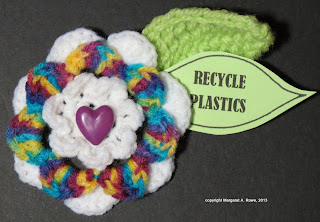1000 Flowers for the Planet - #63 Live Without Plastic
This week will be ‘plastic week’ and I’m
starting with a really major suggestion – Live Without Plastic. If you think
this idea is huge, you’re right. But
there are people out there actually doing it – living their lives plastic free.
It takes a huge commitment to a huge
idea and I have to say I admire these people for doing it, because there are so
many little things that have to be resolved along the way. Please do an
Internet search for living a plastic free life and read some of the blogs that
are inspiring, thought provoking, provocative and challenging. See what ideas
resonate with you and try them out for yourself. Understand why these people are going to such
extreme lengths to avoid plastic.
You may also like to research how harmful
plastics can be to the human body – how they can cause health problems in many
people. Plastic waste also clogs up the waterways, kills marine and bird life,
adds to landfill, and causes health issues for many living creatures.
It fascinates me that we’ve had a few ‘oil
crises’ over the last few decades, that there is concern about oil running out
and that we desperately need to find more oil to take out of the earth, to run
our cars etc. Walk into your local shopping centre/mall and take a look around
– you will see plastic everywhere.
And
the next time you’re at the supermarket, try to find food that doesn’t come
with plastic – you’ll find this a very hard task. Plastic is made from oil, but there doesn’t seem to be any outcry that we need
to produce less plastic to save our oil reserves. This doesn’t make sense.
The world has produced as much plastic in
this past decade as it did for the entire 20th century. So live
without plastic, or live with less plastic, and save not only the planet, but
yourself.
P.S. I don’t agree with everything the
plastic free proponents put on their blogs. I particularly disagree with
purging plastic from one’s home in order to replace it with plastic-free
products. I do understand they are concerned about their health, but the down
side is that perfectly useful product is being tossed into landfill, or given
to charity shops where someone else can buy it and have their health affected. I suggest replacing plastic items after they have completely worn out or
become useless. There are more arguments for being plastic-free than health,
including but not limited to saving the planet’s resources, preventing
landfill, saving money and reducing consumerism.




























